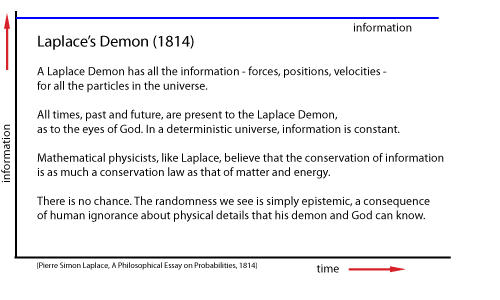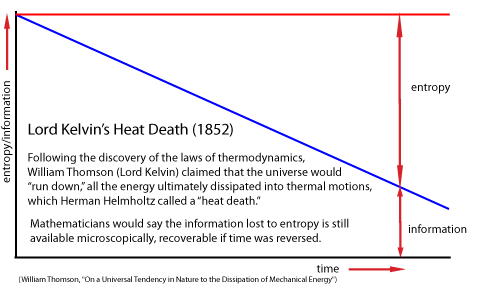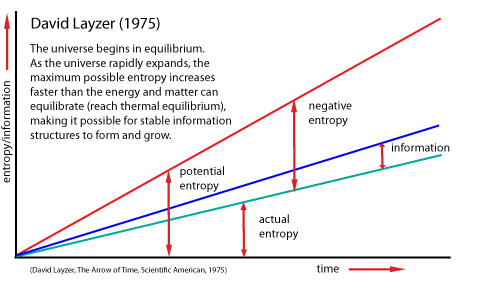In the introduction to his 1814
Essai philosophique sur les probabilités,
Pierre-Simon Laplace extended an idea of
Gottfried Leibniz which became famous as Laplace's Demon, the
locus classicus definition of strict physical determinism, with its one possible future.
Laplace said,
"We may regard the present state of the universe as the effect of its past and the cause of its future. An intellect which at a certain moment would know all forces that set nature in motion, and all positions of all items of which nature is composed, if this intellect were also vast enough to submit these data to analysis, it would embrace in a single formula the movements of the greatest bodies of the universe and those of the tiniest atom; for such an intellect nothing would be uncertain and the future just like the past would be present before its eyes."
Nous devons donc envisager l'état présent de l'universe comme l'effet de son état antérieur, et comme la cause de celui qui va suivre. Une intelligence qui pour un instant donné connaîtrait toutes les forces dont la nature est animée et la situation respective des êtres qui la composent, si d'ailleurs elle était assez vaste pour soumettre ces données à l'analyse, embrasserait dans la même formule les mouvements des plus grands corps de l'universe et ceux du plus léger atome; rien ne serait incertain pour elle, et l'avenir comme le passé serait présent a ses yeux.
(Essai philosophique sur les probabilités, 1814)
Laplace postulates a super-intelligence that could know the positions, velocities, and forces on all the particles in the universe at one time, and thus know the universe for all times. The concept has been criticized for the vast amount of information that would be required, impractical if not impossible to collect instantaneously. And where would the information be kept? If in some part of the universe, there would be an infinite regress of information storage.
If we imagine this as a purely mental exercise, involving only the
idea of such knowledge, we can see that Laplace's demon is a secular substitute for an omniscient God with perfect
foreknowledge.
We can compare 'god-willing" in Islam (inshallah) and "everything happens for a reason" in Christianity
Now Catholics claim we have free will despite God's knowing whereas Reformation protestants following Martin Luther or John Calvin believe that everything is pre-ordained or
pre-determined from the time of God's creation..
Laplace's view implies that the past, the present, and the future always contain exactly the same knowledge. This makes information a constant of nature. Indeed, some mathematicians think that information is a conserved quantity (the blue line in the figure), like the conservation of mass and energy (for example.
Seth Lloyd at MIT, who thinks the universe is a computer).

However, midway through the 19th century,
Lord Kelvin (William Thomson) realized that the newly discovered second law of thermodynamics required that information could not be constant, but would be destroyed as the entropy (disorder) irreversibly increased. Hermann Helmholtz described this as the heat death of the universe.
Physicists, including
Ludwig Boltzmann, described entropy as "lost information," although many mathematicians thought the lost information might be recoverable (for example, by reversing the time).

Kelvin’s claim would be correct if the universe were a closed system. But in our open and expanding universe,
David Layzer showed that the maximum possible entropy is increasing faster than the actual entropy. The difference between maximum possible entropy and the current entropy is called negative entropy, opening the possibility for complex and stable information structures.

So the current view of the universe is that it begins with a "heat birth" and ends with a "cold death."
So we now know that a Laplace Demon is impossible, and for two distinct reasons. The old reason was that modern quantum physics is inherently
indeterministic. The future is only
probabilistic, though it may be "
adequately determined."
The new reason is that there is not enough information in the past (none at all in the early universe) to determine the present.
The "fixed past" and the "laws of nature" pre-determine nothing, despite recent philosophical arguments that Newton's Laws do determine the future..
Similarly, information at the present time does not determine the future.
Our future is open. We must create it.
It follows that
determinism, the philosophical idea that every event or state of affairs, including every human decision and action, is the inevitable and
necessary consequence of antecedent states of affairs or causes, is not true.
More precisely, determinism, or
determination by some preceding events as causes, should be distinguished from the
pre-determinism of Laplace's time, the idea that the entire past (as well as the future) was determined at the origin of the universe.
Earlier versions of Laplace's idea
Gotfried Leibniz (1646-1716) imagined a scientist who could see the events of all times, just as all times are thought to be present to the mind of God.
"Everything proceeds mathematically...if someone could have a sufficient insight into the inner parts of things, and in addition had remembrance and intelligence enough to consider all the circumstances and take them into account, he would be a prophet and see the future in the present as in a mirror."
The little-known Serbian scientist Roger Joseph Boscovich (1711-1787) developed an atomic theory, and understood the implications of knowing the positions, velocities, and forces of all the atoms...
Any point of matter, setting aside free motions that arise from the action of arbitrary will, must describe some continuous curved line, the determination of which can be reduced to the following general problem. Given a number of points of matter, & given, for each of them, the point of space that it occupies at any given instant of time; also given the direction & velocity of the initial motion if they were projected, or the tangential velocity if they are already in motion; & given the law of forces expressed by some continuous curve, such as that of Fig. 1, which contains this Theory of mine; it is required to find the path of each of the points, that is to say, the line along which each of them moves. [...] Now, although a problem of such a kind surpasses all the powers of the human intellect, yet any geometer can easily see thus far, that the problem is determinate, & that such curves will all be continuous [...] & a mind which had the powers requisite to deal with such a problem in a proper manner & was brilliant enough to perceive the solutions of it (& such a mind might even be finite, provided the number of points were finite, & the notion of the curve representing the law of forces were given by a finite representation), such a mind, I say, could, from a continuous arc described in an interval of time, no matter how small, by all points of matter, derive the law of forces itself; [...] Now, if the law of forces were known, & the position, velocity & direction of all the points at any given instant, it would be possible for a mind of this type to foresee all the necessary subsequent motions & states, & to predict all the phenomena that necessarily followed from them.
(A Theory of Natural Philosophy, 1763, MIT Press (1960), p. 141, quoted by Carlo Cercignani, Ludwig Boltzmann, p.55.)
And both of these were anticipated by ancient philosophers, perhaps also influenced by an atomic theory of matter of
Democritus and
Epicurus.
In his work
On Divination, Cicero (106-43) explained the
deterministic, even fatalistic, theory of the Stoics, with their all-knowing God,
Besides, since everything happens by fate, as will be shown elsewhere, if there could
be any mortal who could observe with his mind the interconnection
of all causes, nothing indeed would escape him. For
he who knows the causes of things that are to be necessarily
knows all the things that are going to be. But since no one
but God could do this, what is left for man is that he should
be aware of future things in advance by certain signs which
make clear what will follow. For the things which are going
to be do not come into existence suddenly, but the passage
of time is like the unwinding of a rope, producing nothing
new but unfolding what was there at first.
(Cicero, On Divination, 1.127.)